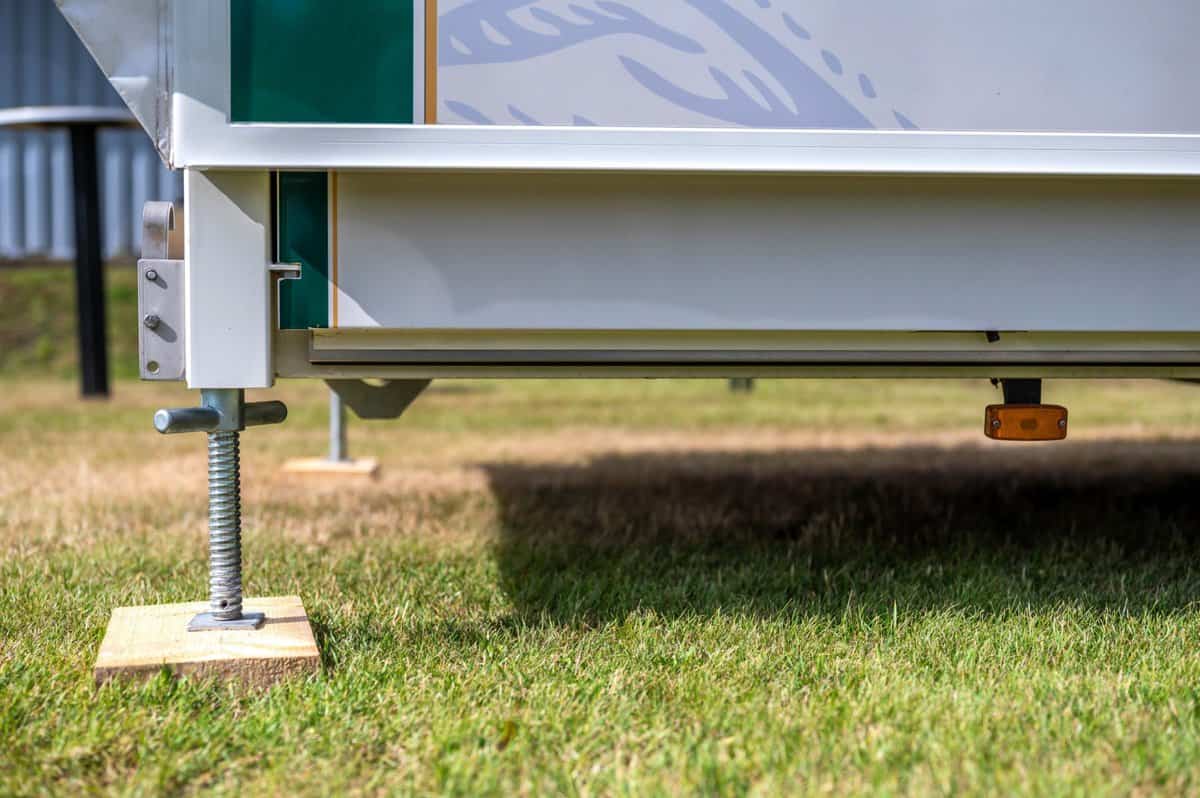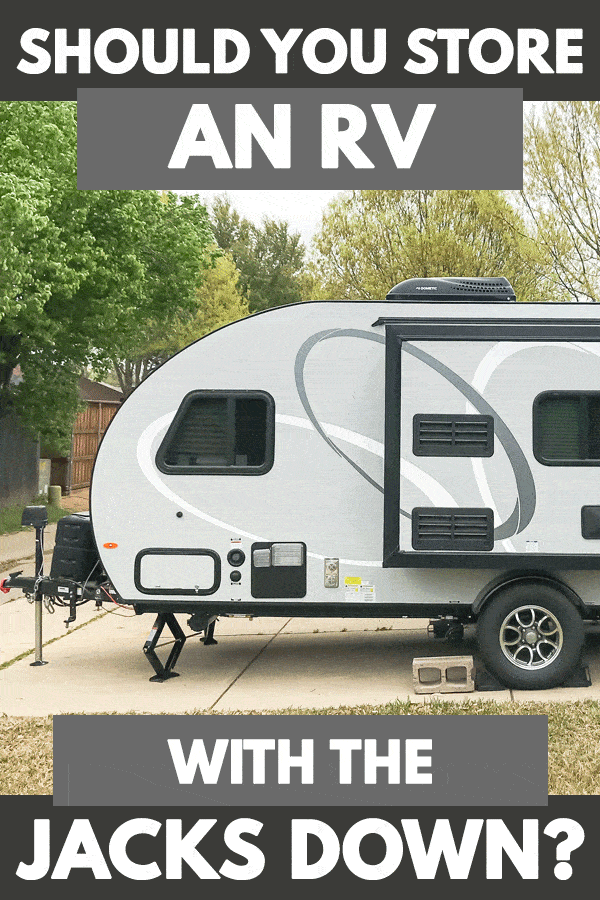When storing your RV, one key question is - should you keep the jacks down or not? Proper jack use during storage helps maintain your vehicle's condition. However, there are pros and cons to consider.
The answer depends on three main factors - the type of RV you have, the length of storage time, and the weather and location. Storage needs differ for motorhomes, travel trailers, and fifth wheels.
Short and long-term storage also require varied approaches. Environmental conditions like humidity and winter temperatures impact storage setup. In this article, we'll explore the benefits and drawbacks of storing your RV with jacks engaged versus retracted.
You'll learn how RV classification, storage duration, and weather affect jack requirements. With these key considerations in mind, you can determine the best jack positioning to store your RV safely.
Leveling Your RV in Storage
Leveling your RV properly is an important first step when preparing for storage. Class A motorhomes often have auto-leveling systems that use front jacks and rear stabilizers to level the RV at the push of a button.
For other RV types without auto-leveling, you'll need to level manually using blocks and a bubble level placed on a flat surface inside. Check that the RV is even side-to-side first.
If uneven, lift the lower side with blocks under the wheels. Then check front-to-back. If the front or back is lower, drive those wheels onto blocks to lift that end.
If it's uneven both ways, lift the lowest corner. For towables, chock wheels and level side-to-side first before front-to-back. Taking the time to level your RV when storing will help prevent strain on components.

Important Storage Considerations
An important question to ask is, should I store my RV with the jacks down? The answer depends on several factors.
First, consult your owner's manual for the manufacturer's specific storage recommendations based on your RV model. Performing thorough inspections and maintenance before storage is also wise.
Check the condition of systems like the tires, jacks, appliances, plumbing, and more. Winterizing the RV will prevent damage if stored in freezing temperatures.
Carefully select a storage location that is dry, cool and prevents exposure to things like extreme heat, sap dripping, or moisture, which could cause deterioration.
It's also important to follow any local regulations concerning RV storage length and placement. Taking steps to store your RV properly will maintain its condition and prepare it for future adventures on the road.
Storing Motorhomes
Motorhomes integrate living spaces, so towing is not needed. For Class A models, some use jacks to prevent shifting during storage due to their size. Chocking wheels and blocking jacks can also help.
Class B and C motorhomes are smaller with less integrated living areas. Their height makes them prone to rocking, so using stabilizer jacks is recommended. Inspect jacks for overextension or moisture exposure.
Alternating jack extensions helps prevent uneven wear over time. Perform routine maintenance checks before storing long-term.
The key for any motorhome is preventing motion and preparing appliances for storage conditions. Following manufacturer guidance and leveling properly will ensure your motorhome stays in quality condition while not in use.
If you're not familiar with these classifications, check out our guide about the 7 types of RV's here.
Storing Travel Trailers
Travel trailers require a hitch for towing vehicles like trucks or SUVs. Their range of sizes means larger models need more robust towing capacity.
When storing a travel trailer camper, should you put stabilizers down when storing the camper? In most cases, travel trailers do not require jacks or stabilizers down for storage due to their stable design.
Some may use jacks periodically for added wind resistance or if they are living in the unit. However, travel trailers' wheel and hitch configurations reduce the need for stabilization from jacks.
As long as tires are properly inflated, the suspension avoids undue strain when jacks are retracted. Performing thorough inspections and tire pressure checks as part of regular maintenance is also recommended.
Learn how to build a solid RV parking pad on your property with this guide.
Storing Fifth Wheels
Fifth wheels require large trucks to tow due to their size and integrated hitch design. Their stability comes from sway reduction and even weight distribution.
This stability means fifth wheels generally don't need jacks down for storage. For short stays, wheel chocks sufficiently stabilize the vehicle.
Some use jacks long-term to reduce suspension strain and deter theft. But tire deflation could overload jacks not meant for stabilization.
Fifth wheels' sturdy construction allows for jacks-up storage in many cases. Perform tire inflation checks if relying solely on wheel chocks during storage.
Like with travel trailers, emphasis should be on proper maintenance to maximize fifth wheels' natural stability.
Key Considerations When Deciding on Jacks Up or Down RV Storage
The three most important factors in deciding whether to store your RV with jacks down are the RV type, length of storage, and weather/location.
Motorhomes often benefit from jacks for stabilization, especially smaller Class B and C models. Fifth wheels and travel trailers are inherently more stable, so jacks are optional in many cases.
For long-term storage, using jacks helps reduce strain on the chassis and tires over time. However, for short stays, wheel chocks are typically sufficient to stabilize the RV.
Inclement weather, like high winds, may also necessitate jacks for extra security. Be sure to winterize systems for storing through freezing temperatures.
Overall, proper tire inflation, leveling, and regular inspection are key, no matter how you store your RV. For long-term storage, using jacks provides added stability. But for short stays, wheel chocks are usually enough to store your RV when following good maintenance practices safely.
Follow our easy RV winterizing checklist to prepare your vehicle for cold weather.


I like how you mentioned that if you are going to store your 5th-wheel RV for a while then you should put the jacks down. I have always wanted an RV but I have been afraid of not knowing what to do with it if I have to store it. If I get one, I’ll make sure to put the jacks down whenever I leave it in storage somewhere.
Thanks for leaving us a comment, Franklin. We’re glad you found this post useful. Be sure to check out our other RV-related content for more good information!
Hi Jacob my question for you today is do I leave the jacks down in the front and at the back on my 5th wheel to winterize it. I had a camper before and all jacks had to be up for winter storage. Thanks